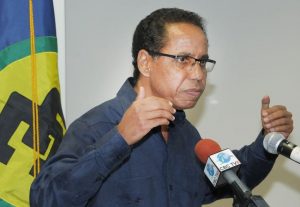Statement by Barbados’ Ambassador to CARICOM, David Comissiong – It Is Our CXC: Let Us Work Out A Solution
In the interest of those 5th and 6th form students across our region who have been negatively impacted by the controversy surrounding the declared results of this year’s Caribbean Examinations Council’s exams, it is critically important that a remedial process be quickly settled upon and applied.
However, I fear that the search for such a solution is in danger of being delayed by the many misunderstandings and misconceptions that seem to surround the CXC, and the manner in which those misconceptions and misunderstandings are resulting in “us against them” attitudes and positions.
I, therefore, think it is important that I – in my capacity as Barbados’ Ambassador to CARICOM – make an effort to disseminate some information as to what CXC is and what it is not.
First of all, it needs to be understood that the CXC is an institution of CARICOM, and is, therefore, owned and financed by the member states of CARICOM.
The CXC was established by our Commonwealth Caribbean governments in 1972. It was decided back then that the operations of the Council would be divided into an Eastern Zone (headquartered in Barbados) and a Western Zone (headquartered in Jamaica).

The inaugural Meeting of the CXC was held in Barbados in 1973, and Barbados went on to play an extremely important role in the development of CXC. In fact, the very first Chairman of CXC was Professor Roy Marshall (a Barbadian); the first Deputy Chairman was Mr. Algernon Simmonds (a Barbadian), and the first Registrar was Major H. Daniel (a Barbadian).
It is important that we understand that CXC is not the headquarters building situated at Pine Plantation Road in St. Michael, Barbados, nor is it the Registrar, Dr. Wayne Wesley!
CXC is actually a forty-two member Council comprising the Vice Chancellor of the University of the West Indies (currently Sir Hilary Beckles) and three other representatives of the UWI; the Vice Chancellor and one other representative of the University of Guyana; two representatives of the Governments of Barbados, Guyana, Trinidad and Tobago, and Jamaica; one representative of the governments of the other twelve countries that participate in the Council; and one representative of the teaching profession appointed by each of the National CXC Committees of the sixteen participating nations.
It is important to note that every country that participates in the CXC is required to establish a National Committee comprising representatives of its Ministry of Education and its Teaching Profession, as well as representatives of its “general community”. The function of this National Committee is to “advise the Council on matters connected with examinations conducted by the Council”.
It also needs to be noted that CXC functions under the auspices of, and is answerable to, one of the “Organs” of CARICOM: namely, the Council for Human and Social Development (COHSOD). The Education component of this Council consists of the Ministers of Education of our fifteen CARICOM member states.
So, let us be very clear that the folk who work at the CXC headquarters building at Pine Plantation Road in Barbados are only employees and functionaries of the Council, and their role is merely to administer and implement the policies that are decided upon by the Council.
Now, having established that factual background, let us concede that this year of 2020 was an especially difficult year for the CXC, in that the Council had to deal with the challenges posed by COVID-19, and had to respond by making sudden changes to the modus operandi of its examinations.
Not unexpectedly, those sudden changes to the modus operandi seem to have resulted in some degree of malfunction – particularly in relation to the more strictly “academic” subjects tested by CXC.
And it seems to me that the malfunction is more likely to have been to the computerised methodology for processing the marks obtained by the students, rather than to the system of marking itself.
